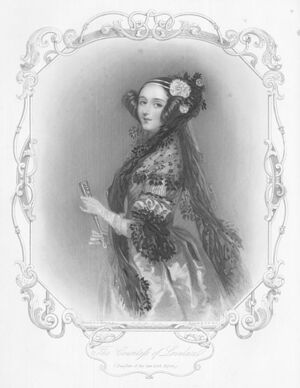Ada Lovelace (nonfiction): Difference between revisions
Jump to navigation
Jump to search
No edit summary |
|||
| Line 1: | Line 1: | ||
'''Augusta Ada King''', '''Countess of Lovelace''' (née '''Byron'''; 10 December 1815 – 27 November 1852) was a British mathematician and writer, chiefly known for her work on [[Charles Babbage (nonfiction)]]'s early mechanical general-purpose computer, the [[Analytical Engine (nonfiction)]]. | [[File:Ada_Lovelace.jpg|thumb|Ada Lovelace. Engraving circa 1838.]]'''Augusta Ada King''', '''Countess of Lovelace''' (née '''Byron'''; 10 December 1815 – 27 November 1852) was a British mathematician and writer, chiefly known for her work on [[Charles Babbage (nonfiction)]]'s early mechanical general-purpose computer, the [[Analytical Engine (nonfiction)|Analytical Engine]]. | ||
Her notes on the engine include what is recognised as the first algorithm intended to be carried out by a machine. Because of this, she is often regarded as the first [[computer programmer (nonfiction)]]. | Her notes on the engine include what is recognised as the first algorithm intended to be carried out by a machine. Because of this, she is often regarded as the first [[computer programmer (nonfiction)|computer programmer]]. | ||
== Nonfiction cross-reference == | == Nonfiction cross-reference == | ||
Revision as of 15:22, 11 June 2016
Augusta Ada King, Countess of Lovelace (née Byron; 10 December 1815 – 27 November 1852) was a British mathematician and writer, chiefly known for her work on Charles Babbage (nonfiction)'s early mechanical general-purpose computer, the Analytical Engine.
Her notes on the engine include what is recognised as the first algorithm intended to be carried out by a machine. Because of this, she is often regarded as the first computer programmer.
Nonfiction cross-reference
Fiction cross-reference
External links
- Ada Lovelace @ Wikipedia
